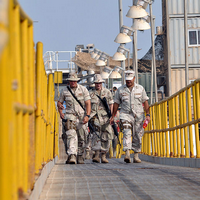“The CTBT is in big, big trouble,” said Stephen Rademaker at an East West Institute roundtable on the ever-stalled Comprehensive Nuclear Test Ban Treaty last Friday. The remark represented a rare area of consensus on what is otherwise a highly divisive issue. The EWI discussion of the CTBT and its likelihood of ratification by Congress came as a complement to a recently published report by the institute on the subject. With Rademaker, former U.S. assistant secretary of state (2002-2006) and currently senior counsel for BGR Group’s Government Affairs division, and Ambassador Robert T. Grey, Jr., director of the Bipartisan Security […]
Iran Archive
Free Newsletter

In a two-round bidding procedure that concluded in mid-December, the international oil industry regained access to Iraq’s upstream resources for the first time since the 1975 nationalization, with service contracts awarded for the development of 13 major fields. Although some critics denounced the deals as a sell-off of Iraq’s resources to foreigners, Iraqi Oil Minister Husain al-Shahristani negotiated very good terms for them. Production will rise from the current 2.5 million barrels per day (mbpd) to 12 mbpd, and Iraq will be in control of every drop of oil extracted on payment of fees amounting to only $1 to $1.50 […]

“Iran engagement” is beginning to take on the attributes of kabuki theater, with all of the major participants engaging in pre-determined, stylized dance steps. The latest case in point is the announcement earlier this week by Iranian President Mahmoud Ahmadinejad that Tehran is now open to some form of the scheme proposed by the International Atomic Energy Agency last October, by which Iran would export its low-enriched uranium to France and Russia to be turned into fuel rods for its research reactor. As Howard LaFranchi reported, this “was received favorably by Russia, and it prompted Chinese officials to call for […]
Here are a few of this week’s highlights from WPR’s video section: – Iranian President Mahmoud Ahmadinejad returns to the negotiating table with a deal that makes some observers wary. WorldFocus discusses the warranted skepticism in this video. – Afghan farmers receive attention from the USDA as one of the United States’ top non-military priorities. Secretary of Agriculture Tom Vilsack briefs the press in this video. And agricultural initiatives can be seen at work in this video. – Secretary of State Hillary Clinton discussed positive developments in N. Ireland in this video. Our video section is updated daily. I’ll highlight […]
The New America Foundation and WorldPublicOpinion.org host anevent on what the Iranian public really thinks on key issues and itsimplications for US foreign policy. In this discussion,WorldPublicOpinion.org presents the findings of an in-depth analysis oftwelve well-documented polls from three different sources addressingthe central questions of whether the Iranian people perceive theirgovernment as illegitimate, how they voted in the June 12th election,and how the opposition views the US and Iran’s nuclear program.
WorldFocus’ Daljit Dhaliwal speaks to Geneive Abdo of the CenturyFoundation about the implications of President Ahmadinejad’s latestcompromise for a nuclear agreement. Skeptics look to impendingsanctions on Iran as well as planned protests in Iran next week asmotivation for Ahmadinejad’s latest deal.
If you’re not already reading Laura Rozen every day, I suggest you start doing so. The latest good reason being this story, on the behind-the-scenes role that Japan has been playing in working out an offshore fuel swap agreement for Iran’s medical nuclear reactor. The interesting aspect here is that the “Japan model” — or the technical mastery of all the separate components of a nuclear weapon capacity without the actual bomb — has often been mentioned as one interpretation of Tehran’s political objective. So long as Washington and its partners (notably France) ruled out the possibility of domestic Iranian […]

A number of recent moves suggest that Iran’s mullahs and secular leaders are bridging their recent differences, even if their reconciliation is a begrudging one. These developments are not wholly unexpected. Essentially, the two sides are putting their political, confessional, and personal self-interest above all other considerations. But although the shift will result in a short-term loss of leadership figures for the opposition, the Green Movement’s desire for sweeping change has now become mainstream. Perhaps the most prominent among opposition leaders who have recently come in from the cold is former two-time president and consummate political survivor, Ayatollah Akbar Hashemi […]
